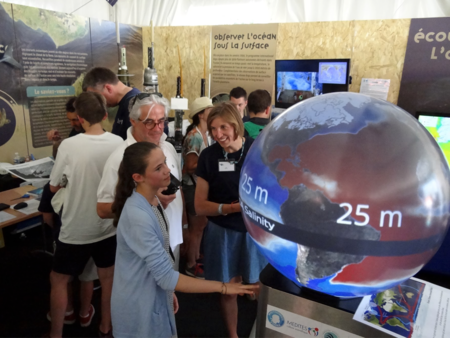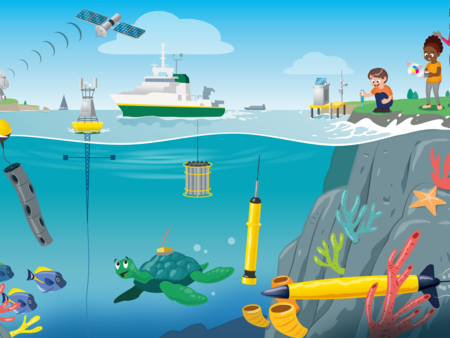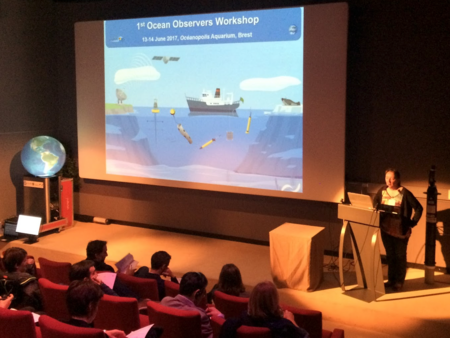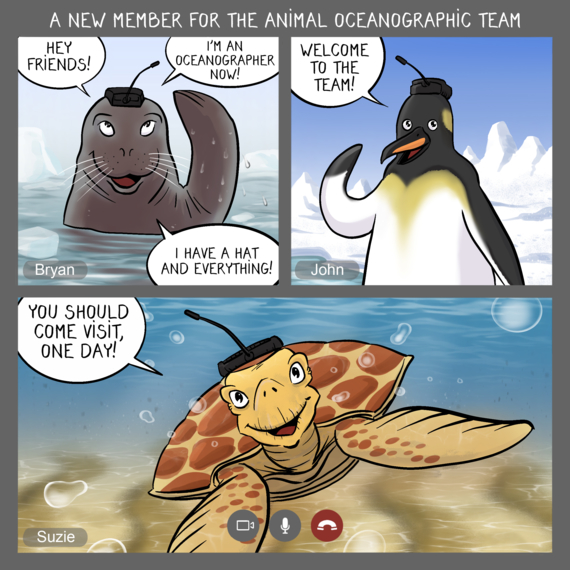Animal borne ocean sensors - AniBOS
What are animal borne ocean sensors?
Some marine animals travel many kilometers and can dive to great depths to find food. For several years, scientists have been fitting them with sensors to record oceanographic observations and better understand their feeding behavior over long distances. They are particularly efficient for sampling locations difficult to access for other ocean observing instruments, such as the Southern Ocean.
The Animal Borne Ocean Sensors (AniBOS) network has been set up in 2020 to expand the already existing animal sensors networks.
How does it work? What kind of animal can help scientists?
Not all marine animals are qualified for the job of oceanographer. Pinnipeds, and particularly seals, are already widely used, owing to their widespread distribution, large body size, dive adaptation and relative easiness to be caught and manipulated. Penguins and sea turtles can also be recruited. Other species such as seabirds, sharks, and fish, sometimes harder to handle, are starting to join the ranks.
Once the animal is captured and secured, the device is positioned so as not to disturb the animal's movements and behavior before being released. Animal welfare is a priority and the program follows the strictest standards for the use of animals for scientific and observational purposes.
What kind of ocean observations are collected?
The information collected depends on the species.
Main observations collected:
- Temperature
- Pressure
- Conductivity > Salinity
- Oxygen
- Fluorescence and light > Chlorophyll
In the ocean, the water produces a certain amount of force on every object or living being inside it. It comes from the weight of water above and is called pressure. The deeper you go, the more water there is above you, the higher the pressure.
Conductivity measures a material's ability to conduct an electric current. In the sea, it is linked to how much salt there is.
What are the observations helping with?
Here are some examples of how the information gathered can be used.
Operational services
Observations provided by animal oceanographers help with monitoring circulation changes in the upper ocean. It can also be useful to feed ocean forecasting systems and fine-tune seasonal climate forecast models.
Climate change
Climate change affects the temperature in the ocean. These sensors record direct observations of heat content variability in the upper ocean, allowing to map seasonal heat content and anomalies, like marine heatwaves.
The information collected can also provide insight about the water masses and possible stratification.
Stratification occurs when the ocean forms layers of water that don’t mix. It blocks the flow of oxygen, nutrients and heat, threatening ocean health and preventing the ocean from playing its role in attenuating climate change.
Ocean health
Animal oceanographers provide a way to study and protect the animals themselves. It records their location, so scientists can draft habitat maps, observe migration patterns and survey marine hotspots, where you can find high numbers of endemic or endangered species. It is crucial information for planning and implementing efficient protection policies.
An endemic species is a species uniquely found in one part of the world.
Where can we find it?
Animal-borne sensors are used to gather observations from under-sampled, remote ocean locations. For example, elephant seals are effective for sampling inhospitable regions around Antarctica.
AniBOS key numbers
- Average depth sampled by elephant seals: 500m
- Average depth sampled by seals, penguins and sea turtles: 100-300m
- AniBOS project starting year: 2020
Learn more about animal borne sensors
Launched in 2020, the AniBOS network is still in a developing stage. The animal-borne observations can be integrated with other networks, such as those from Argo floats, ships, and gliders, to inform a range of operational oceanographic applications.
If you want to learn more about this program, visit the AniBOS website.





